Worldlog Marianne Thieme 1 de maio de 2018
The 22nd of April was International Earth Day. On that day, people all over the world reflect on all the beauty of the earth. Such a day demonstrates well that the problems surrounding nature, environment and climate change are transboundary and that we should collaborate to tackle these problems. I see that such awareness is growing, wherever I go. Just recently, I was in Sweden and Germany to give lectures. I was invited to Sweden by our sister party Djurens parti and to Germany by a theological university. The lecture in Germany was attended by visitors from Georgia, Hungary, the Czech Republic and Ghana among others. It’s wonderful to see that increasingly more people from different backgrounds are demanding a different kind of politics: politics focussed on sustainability and compassion instead of economic growth.
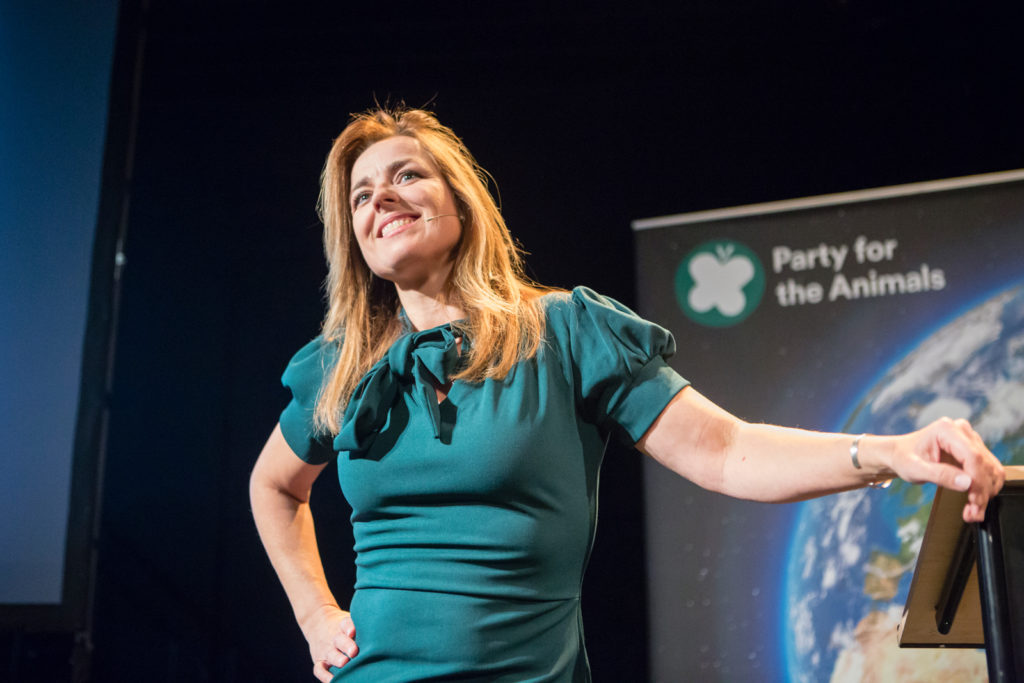
Marianne during her lecture in Sweden
Together we are in strong position: This is also demonstrated by the fight against bullfighting. Thanks to an international campaign conducted by CAS International, the European Parliament decided in 2015 that the European Union must stop its subsidies for bullfighting. The Dutch Lower House already accepted our motion to stop those subsidies in 2013. The European Commission has, however, ignored the wish of the European Parliament for years. But the EU subsidy policy is currently being reviewed, so there’s a chance again that the European Commission will decide not to invest any more money in the bullfighting industry. On the 4th of April, CAS International protested against the current European subsidies, opposite the Lower House, and our MEP Anja Hazekamp attended this protest, together with our member of the Lower House, Femke Merel Arissen. You, as a citizen, can also help to pressure European policy makers: sign the petition against the European subsidies for bullfighting here !
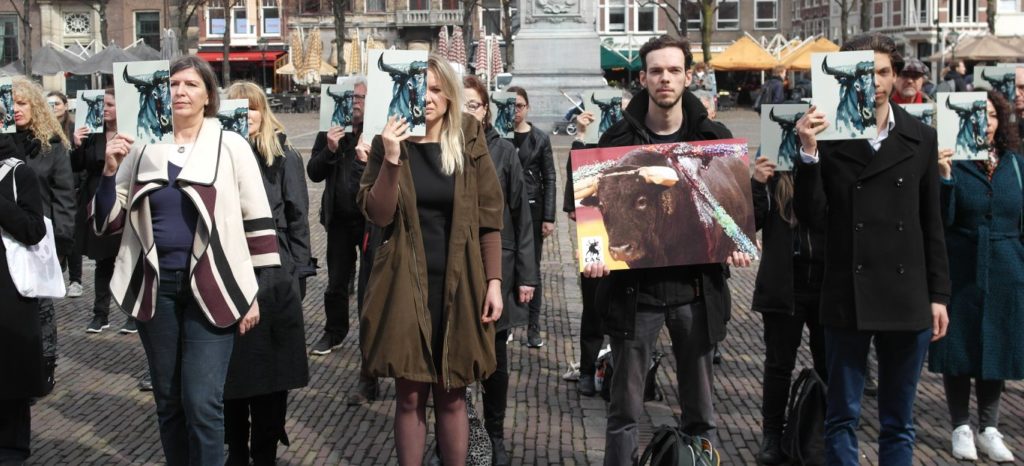
Femke Merel and Anja Hazekamp of the Party for the Animals at the protest against subsidies for bullfighting
The 24th of April was World Lab Animals Day. Worldwide, the number of animals that are used in animal testing is estimated at 115 million every year, of which 12 million animals are used in Europe. The Netherlands even has the largest Primate Testing Lab of Europe, the BPRC. 1500 monkeys are used there in gruesome experiments. Some monkeys get electrodes placed in their heads while others are made ill with the most horrifying diseases. We have drawn attention to what’s happening to those monkeys but also to the millions of other animals that are pointlessly used as testing animals all over the world. The Dutch government has said before that the Netherlands must be frontrunner in research without animal testing. So, it’s odd that an institute such as BPRC is still open.
Certainly, in these times of quick innovations and technological developments, there are sufficient alternatives for animal testing, but our governments refuse to invest enough money into them. We keep pressuring the government and the EU to stop the cruelties in the animal testing industry!
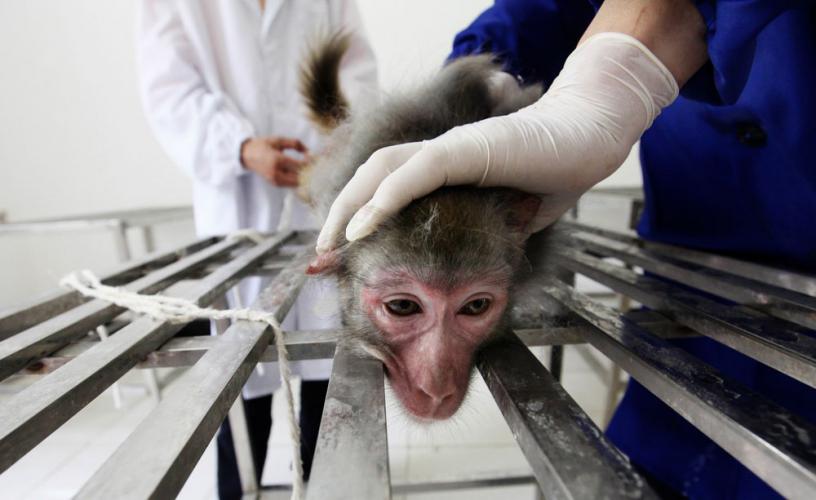
Experiments on monkeys
Almost half of all grains and vegetable proteins that are grown all over the world are fed to farming animals. What a waste of farming land, water and food that humans could eat directly. Our huge meat consumption is decadent. Even the most mainstream institutes and companies are now aware of this. The authoritative institute the World Food Organisation already sounded the alarm bell because the livestock industry poses a threat to our food security, nature and the environment. This month, the Council for the Living Environment and Infrastructure (an important advisory council of the Dutch government) adopted an urgent advice: the livestock industry must be considerably decreased to be able to achieve the Paris climate objectives and consumers must make their contributions too by consuming less meat and dairy products.
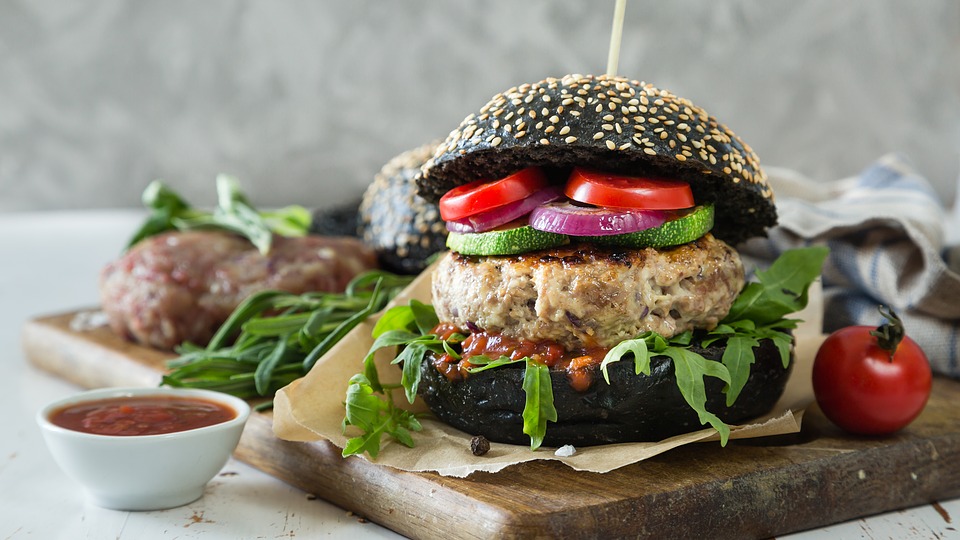
Vegan burger
But despite this scientific advice of its own advisory council, the Dutch government is hiding its head in the sand again and is ignoring the advice. The government’s intense lobbying this month even achieved that Dutch veal meat can be exported to China again. One of the most climate-, environmentally and animal-unfriendly measures a government can take. But fortunately, we see that others do dare to contribute to a positive change for humankind, animals and the environment. Increasingly more companies and educational institutes aim at local, organic and vegetable products. Read here the article of The Guardian about how veganism is becoming more mainstream.
Until the next time!
Marianne
O dia 22 de abril foi o Dia Internacional da Terra. Nesse dia, pessoas de todo o mundo refletem sobre toda a beleza da Terra. Tal dia demonstra bem que os problemas que envolvem a natureza, o meio ambiente e as mudanças climáticas são transfronteiriços e que devemos colaborar uns com os outros para resolver esses problemas. Eu vejo que essa consciência está crescendo, onde quer que eu vá. Recentemente, estive na Suécia e na Alemanha para dar palestras. Fui convidada para ir à Suécia pelo nosso partido irmão Djurens parti e para a Alemanha por uma universidade teológica. A palestra na Alemanha contou com a participação de visitantes da Geórgia, Hungria, República Tcheca e Gana, entre outros. É maravilhoso ver que cada vez mais pessoas de diferentes origens estão a exigir um tipo diferente de política: uma política focada em sustentabilidade e compaixão, em vez de crescimento econômico.
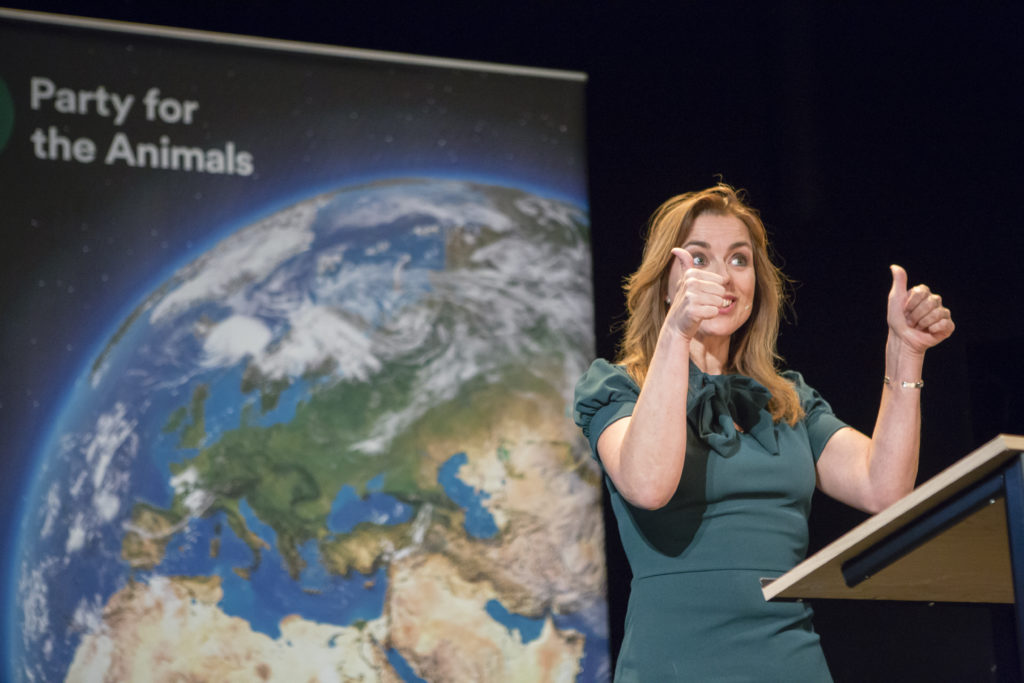
Marianne durante sua palestra na Suécia
Juntos estamos em uma posição forte: isso também é demonstrado pela luta contra as touradas. Graças a uma campanha internacional conduzida pela CAS International, o Parlamento Europeu decidiu em 2015 que a União Europeia deve parar com os subsídios para as touradas. A Câmara dos deputados da Holanda já aceitou a nossa moção para acabar com esses subsídios em 2013. A Comissão Europeia, no entanto, ignorou o desejo do Parlamento Europeu durante anos. Mas a política de subsídios da UE está sendo revisada atualmente, então há uma chance de que a Comissão Europeia decida não investir mais dinheiro na indústria de touradas. No dia 4 de abril, a CAS International protestou contra os atuais subsídios europeus, em frente à Câmara Baixa, e nossa eurodeputada Anja Hazekamp compareceu a esse protesto, junto com nossa membro da Câmara dos Deputados, Femke Merel Arissen. Você, como cidadão, também pode ajudar a pressionar os tomadores de decisões e políticos europeus: assine aqui a petição contra os subsídios europeus às touradas!

Femke Merel e Anja Hazekamp do Partido para os Animais no protesto contra os subsídios para as touradas
O dia 24 de abril foi o Dia Mundial dos Animais de Laboratório. Em todo o mundo, o número de animais utilizados em testes em animais é estimado em 115 milhões por ano, dos quais 12 milhões são usados na Europa. A Holanda tem até o maior Laboratório de Testes de Primatas da Europa, o BPRC. Neste local, 1500 macacos são usados em experimentos macabros. Alguns macacos obtêm eletrodos colocados em suas cabeças enquanto outros são infectados com as doenças mais terríveis. Chamamos a atenção para o que está a acontecer com esses macacos, mas também para os milhões de outros animais que são usados sem propósito como animais de testes em todo o mundo. O governo holandês disse antes que a Holanda deve estar na vanguarda em pesquisas sem testes em animais. Então, é estranho que um instituto como o BPRC ainda esteja aberto.
Certamente, nestes tempos de rápidas inovações e desenvolvimentos tecnológicos, existem alternativas suficientes para testes em animais, mas nossos governos se recusam a investir dinheiro suficiente neles. Continuamos pressionando o governo e a UE para acabar com as crueldades na indústria de testes em animais!

Experiências em macacos
Quase metade de todos os grãos e proteínas vegetais cultivadas em todo o mundo alimentam animais de criação (cativeiro). Que desperdício de terra agrícola, água e comida que nós humanos poderíamos aproveitar diretamente. Nosso enorme consumo de carne é decadente. Mesmo os institutos e empresas mais tradicionais estão agora cientes disso. O instituto autoritário da Organização Mundial de Alimentos já soou o alarme porque a indústria pecuária representa uma ameaça à nossa segurança alimentar, à natureza e ao meio ambiente. Este mês, o Conselho para o Meio Ambiente e Infraestruturas (um importante conselho consultivo do governo holandês) adotou uma recomendação urgente: a indústria pecuária deve ser consideravelmente reduzida para alcançar os objetivos climáticos de Paris e os consumidores devem fazer suas contribuições também, como por exemplo, consumir menos carne e produtos lácteos.

Hambúrguer vegano
Mas apesar desse conselho científico de seu próprio conselho consultivo, o governo holandês está a esconder a cabeça na areia novamente e está a ignorar a recomendação do Conselho. O intenso lobby do governo neste mês até conseguiu que a carne de vitela holandesa pudesse ser exportada para a China novamente. Uma das medidas mais hostis ao clima, ao meio ambiente e aos animais que um governo pode tomar. Mas, felizmente, vemos que os outros se atrevem a contribuir para uma mudança positiva para a humanidade, os animais e o meio ambiente. Cada vez mais empresas e instituições educacionais visam produtos locais, orgânicos e vegetais. Leia aqui o artigo do The Guardian sobre como o veganismo está se tornando mais popular.
Até a próxima vez!
Marianne